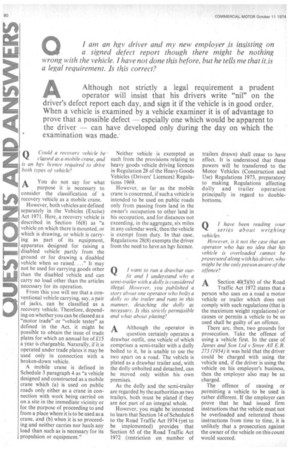Q I have been reading your series about weighing vehicles.
Page 82

If you've noticed an error in this article please click here to report it so we can fix it.
However, is it not the case that an operator who has no idea that his vehicle is overloaded cannot be prosecuted along with his driver, who might be the only person aware of the offence?
A Section 40(5)(b) of the Road Traffic Act 1972 states that a person who uses on a road a motor vehicle or trailer which does not comply with such regulations (that is the maximum weight regulations) or causes or permits a vehicle to be so used shall be guilty of an offence.
There are, then, two grounds for prosecution. Take the offence of using a vehicle first. In the case of James and Son Ltd v Smee All E. R. 273 (1954) it was held that the driver could be charged with using the vehicle and, if the driver is using the vehicle on his employer's business, then the employer also may be so charged.
The offence of causing or permitting a vehicle to be used is rather different. If the employer can prove that he had issued firm instructions that the vehicle must not be overloaded and reiterated those instructions from time to time, it is unlikely that a prosecution against the owner of the vehicle on this count would succeed.




























































































































































